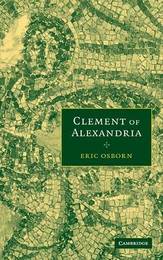
|
Clement of Alexandria
Hardback
Main Details
| Title |
Clement of Alexandria
|
| Authors and Contributors |
By (author) Eric Osborn
|
| Physical Properties |
| Format:Hardback | | Pages:344 | | Dimensions(mm): Height 229,Width 152 |
|
| Category/Genre | Western philosophy - Ancient to c 500
Christian theology |
|---|
| ISBN/Barcode |
9780521837538
|
| Classifications | Dewey:181 |
|---|
| Audience | | Professional & Vocational | | Tertiary Education (US: College) | |
|---|
|
Publishing Details |
| Publisher |
Cambridge University Press
|
| Imprint |
Cambridge University Press
|
| Publication Date |
8 December 2005 |
| Publication Country |
United Kingdom
|
Description
Clement of Alexandria (150-215) lived and taught in the most vibrant intellectual centre of his day. This book offers a comprehensive account of how he joined the ideas of the New Testament to those of the classical world, as represented by Plato. Clement taught that God was active from the beginning to the end of human history and that a Christian life should move on from simple faith to knowledge and love. Clement perceived a sequence of relationships flowing from the transcendent deity: first God and his word, the Son, secondly God and the world, and finally human beings and their neighbours. No part of Plato's ordered universe was closed to the light of Christ, the saviour and lord of all.
Author Biography
Eric Osborn is honorary Professor in History, La Trobe University and Professor Fellow in Classics, University of Melbourne. His most recent publications include Irenaeus of Lyons (2001).
ReviewsFrom the hardback review: 'Professor Osborn addressed this subject in 1957 in his Philosophy of Clement of Alexandria. Now, almost 50 years later, he returns to it with this detailed and concise study. He (Osborn) has taken care to make it accessible: Greek terms are transliterated, and passages are translated. It will be enjoyed not only by those with a special interest in patristic theology, but by a wider readership. They will be introduced to an influential but underestimated pioneer of Christian theological thinking, and will be excited by the broad vision and perceptive insights of a highly creative thinker.' Church Times From the hardback review: 'Eric Osborn has written what will surely become the standard introduction to the thought of Clement of Alexandria. Osborn's treatment provides a detailed analysis and careful appreciation of the thought of Clement. It will not only serve as a standard text on this topic, but, moreover, opens up fresh ways of understanding this highly significant early Christian figure.' Expository Times From the hardback review: '... combines the fermented wisdom of fifty years with the exhileration of one who has rediscovered a friend of his youth ... this is the most astute, the most impassioned and the most learned introduction to Clement's thought that has yet been offered to the English-speaking reader.' Journal of Ecclesiastical History From the hardback review: 'This book is indeed analytic ... But the book is also synthetic. Osborn brings together Clement's often scattered statements on given themes and shows how these fit together to form a 'pilgrim theology'. A remarkable feature of the book is the notion, advanced more than once, that Clement's path-breaking 'fusion of faith with Plato's search for the best reason' ... this rewarding book is demanding ... Osborn provides helpful summary bibliography ... a subject index, and indices of citations from Clement, the Bible, and ancient authors ... This book deserves to be read widely, by patrologists, scholars of classical philosophy, historians of the early Church, theologians, and those working in relating fields. Students of Clement, in particular, will be grateful for Osborn's continued commitment to teach through writing.' Andrew Dinan, Ave Maria University From the hardback review: 'This book deserves to be read widely, by patrologists, scholars of classical philosophy, historians of the early Church, theologians, and those working in related fields. Students of Clement, in particular, will be grateful for Osborn's continued commitment to teach through writing.' Bryn Mawr Classical Review
|